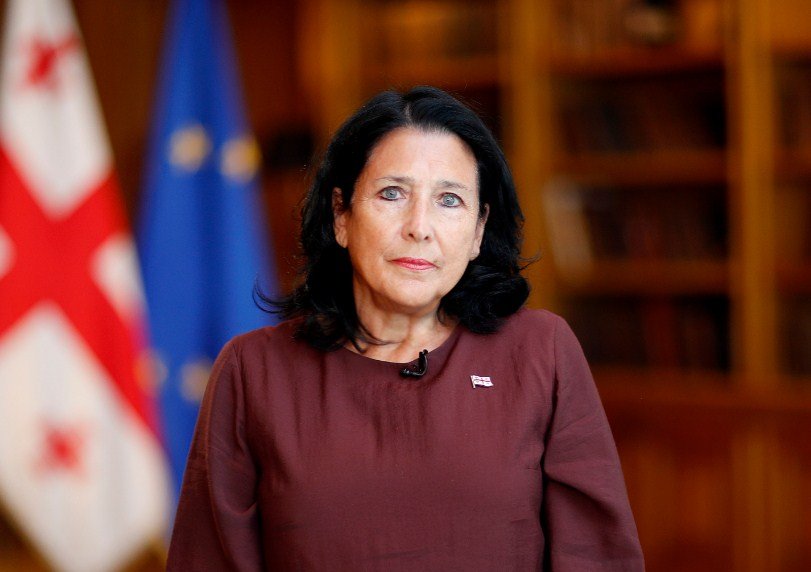On February 6, 2024, President of Georgia Salome Zurabishvili presented her annual report at the plenary session of the Parliament. She celebrated the country’s historic achievement of becoming a candidate for the European Union, but also acknowledged the persistent challenges in the fields of security and democracy.
Georgia’s EU Candidacy: A Great Victory
President Zurabishvili began her speech by congratulating the Georgian people on their great victory of achieving the EU candidacy status. She said that this was the result of years of hard work, reforms, and sacrifices, and that it opened a new chapter in the country’s history.
She thanked the EU for its support and solidarity, and expressed her commitment to continue the integration process and fulfill the obligations and expectations of the candidacy. She also emphasized the importance of maintaining the unity and stability of the country, and avoiding any actions that could jeopardize the EU perspective.
She said that Georgia’s EU candidacy was not only a political and economic goal, but also a cultural and civilizational choice, and that it reflected the aspirations and values of the Georgian people.

Security Challenges: Russia’s Hybrid War
President Zurabishvili then turned to the security challenges that Georgia faced in 2023, especially the hybrid war instigated by Russia. She said that Russia continued to violate Georgia’s sovereignty and territorial integrity, and to undermine its security and stability.
She listed the various forms and weapons of the hybrid war, such as:
- The attempt to convert the port of Ochamchire in the occupied region of Abkhazia into a military base, threatening the strategic prospect of the Black Sea region
- The steps toward annexation of the occupied territories, such as the appropriation of the Bichvinta state residence and the Sokhumi Babushera airport
- The neglect of human rights and the erasure of cultural and identity markers in the occupied regions
- The intimidation, abduction, and targeting of civilians along the occupation line
- The nationwide anti-Western propaganda and the encouragement and financing of pro-Russian factions
- The escalation of cyber-attacks on state institutions
- The massive influx of Russian immigrants and the reliance on Russian capital
- The various provocations, such as the resumption of flights, the unhindered entry of FSB agents and other high-ranking officials, the movement of Russian cruise ships in Batumi, and the display of Stalin’s icon in the Trinity Cathedral
She said that these attacks aimed to instigate discord and confrontation in society, and to threaten Georgia with destabilization. She called for a strong and unified response from the Georgian state and society, and from the international community, to counter Russia’s hybrid war.
She also expressed her solidarity with Ukraine, which faced a relentless war from Russia, and praised the unity and resilience of the Ukrainian people and the support of the European partners.
Democracy Challenges: The Strengthening of Power
President Zurabishvili then addressed the challenges in the field of democracy, which she said were manifested in the unprecedented strengthening of power by the ruling party in 2023. She said that instead of implementing democratic reforms, the government initiated laws that aimed to suppress civil society and to undermine the independence of key institutions.
She cited the examples of the so-called ‘Russian law’, which sought to restrict the activities and funding of non-governmental organizations, the law on the National Bank, which altered the procedure for selecting its governor, the law on the Central Election Commission, which changed the rules for appointing its chairperson, and the attempt to impeach the president, which she said was politically motivated and unconstitutional.
She said that these actions violated the principles of checks and balances, pluralism, and public participation, and that they endangered the democratic development of the country and its European integration.
She urged the government to respect the constitution and the rule of law, to engage in dialogue and cooperation with the opposition and civil society, and to implement the recommendations of the international organizations, such as the Venice Commission and the OSCE.
She also called for the reform of the electoral system, the judiciary, and the media, to ensure fair and transparent elections, the independence and accountability of judges, and the diversity and freedom of expression of journalists.
She said that democracy was not a gift, but a responsibility, and that it required constant vigilance and effort from all stakeholders.
President Zurabishvili concluded her speech by reaffirming her commitment to serve the Georgian people and to defend the interests and values of the country. She said that she was proud of the achievements and hopeful for the future of Georgia, and that she was ready to work with all the political forces and civil society to overcome the challenges and to realize the potential of the country.
She said that Georgia was a small but strong nation, with a rich history and culture, and a clear vision and direction. She said that Georgia’s destiny was to be a part of the European family, and that nothing could stop it from reaching this goal.
